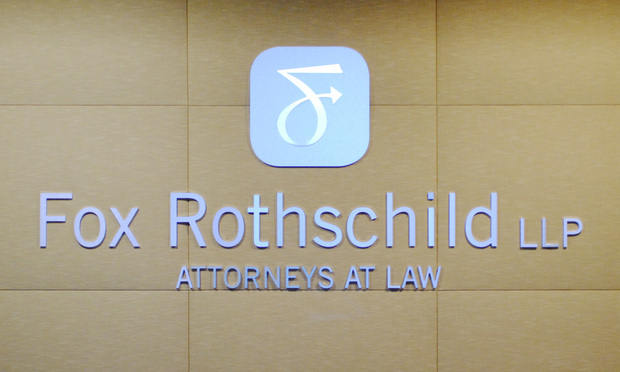Fox Rothschild Headed to New Jersey Supreme Court in Case Stemming From Ponzi Scheme
The high court's review follows an appeals court ruling that revived a claim from a U.K. real estate investor alleging Fox Rothschild improperly let $2.4 million flow through an attorney trust account to a fraudster.
November 20, 2018 at 03:42 PM
3 minute read

The New Jersey Supreme Court will review a London-based real estate investor's lawsuit accusing Fox Rothschild of improperly transferring $2.4 million from the firm's attorney trust account to now-convicted Ponzi schemer Eliyahu Weinstein.
With a notice handed down Nov. 16 and made public Monday, New Jersey's high court agreed to consider whether U.K. real estate investor Moshe Meisels can maintain his claims of conversion and breach of fiduciary duty against Fox Rothschild. Meisels alleged that he was bilked by Weinstein—who previously pleaded guilty to running a yearslong, real estate Ponzi scheme that caused $200 million in losses—and that more than $2.4 million he lost moved through Fox Rothschild's attorney trust account.
The state high court's review comes after an intermediate appeals court in June revived Meisels' conversion claim against the law firm, while it also kept intact a trial court's dismissal of the fiduciary breach claims.
Meisels alleged that he and Weinstein reached an agreement to invest in property in Irvington, New Jersey. In connection with that deal, Weinstein in 2007 directed Meisels to transfer a portion of the investment into Fox Rothschild's attorney trust account, according to court documents. Weinstein, who was later sentenced to 22 years in prison for his Ponzi scheme, told Meisels at the time that Fox Rothschild was carrying out legal work on the property purchase.
Meisels transferred the money, and it later went into the coffers of some of Weinstein's businesses, with $75,000 of it going to Fox Rothschild. The money was never used to purchase any property and, in his suit against the firm, Meisels alleged that Fox Rothschild effectively aided Weinstein as he carried out his fraud.
Lawyers from Fox Rothschild attacked Meisels' claims on several fronts, ultimately convincing a trial court to dismiss them in a summary judgment ruling. Among other arguments, Fox Rothschild said Meisels couldn't pursue his conversion claim because he didn't do enough to show that he actually owned the money he allegedly lost, and because he never demanded its return.
Meisels countered that, while the transfers to the attorney trust account technically came from a company called Rightmatch Ltd., the business was serving merely as a conduit for the London-based Meisels to help convert his own personal funds from the British pound to U.S. dollars.
In June, the Superior Court of New Jersey, Appellate Division found against the law firm on both of those arguments. The appeals court held that Meisels had done enough to prove it was his money that flowed through the firm's trust account. The court also noted that under the facts of this particular case, Meisels wasn't required to demand his money back to be able to claim conversion in court.
The appeals court did, however, come down on Fox Rothschild's side with respect to Meisels' breach of fiduciary duty claim. The appellate ruling affirmed the trial court's conclusion that Fox Rothschild didn't owe any fiduciary duty to Meisels, leaving that claim dismissed.
Fox Rothschild's defense lawyer, Francis Devine III of Pepper Hamilton, did not immediately respond to a request for comment, nor did a lawyer for Meisels, Brian Condon of Condon Catina & Mara in Nanuet, New York.
Read More:
Court Revives Claim That Fox Rothschild Lost Client Funds to Ponzi Schemer
This content has been archived. It is available through our partners, LexisNexis® and Bloomberg Law.
To view this content, please continue to their sites.
Not a Lexis Subscriber?
Subscribe Now
Not a Bloomberg Law Subscriber?
Subscribe Now
NOT FOR REPRINT
© 2025 ALM Global, LLC, All Rights Reserved. Request academic re-use from www.copyright.com. All other uses, submit a request to [email protected]. For more information visit Asset & Logo Licensing.
You Might Like
View All

Latham's Lateral Hiring Picks Up Steam, With Firm Adding Simpson Practice Head, Private Equity GC
3 minute read

Eight Years On, A&O Shearman’s Fuse Legal Tech Incubator Is Still Evolving
4 minute readTrending Stories
- 1Thursday Newspaper
- 2Public Notices/Calendars
- 3Judicial Ethics Opinion 24-117
- 4Rejuvenation of a Sharp Employer Non-Compete Tool: Delaware Supreme Court Reinvigorates the Employee Choice Doctrine
- 5Mastering Litigation in New York’s Commercial Division Part V, Leave It to the Experts: Expert Discovery in the New York Commercial Division
Who Got The Work
J. Brugh Lower of Gibbons has entered an appearance for industrial equipment supplier Devco Corporation in a pending trademark infringement lawsuit. The suit, accusing the defendant of selling knock-off Graco products, was filed Dec. 18 in New Jersey District Court by Rivkin Radler on behalf of Graco Inc. and Graco Minnesota. The case, assigned to U.S. District Judge Zahid N. Quraishi, is 3:24-cv-11294, Graco Inc. et al v. Devco Corporation.
Who Got The Work
Rebecca Maller-Stein and Kent A. Yalowitz of Arnold & Porter Kaye Scholer have entered their appearances for Hanaco Venture Capital and its executives, Lior Prosor and David Frankel, in a pending securities lawsuit. The action, filed on Dec. 24 in New York Southern District Court by Zell, Aron & Co. on behalf of Goldeneye Advisors, accuses the defendants of negligently and fraudulently managing the plaintiff's $1 million investment. The case, assigned to U.S. District Judge Vernon S. Broderick, is 1:24-cv-09918, Goldeneye Advisors, LLC v. Hanaco Venture Capital, Ltd. et al.
Who Got The Work
Attorneys from A&O Shearman has stepped in as defense counsel for Toronto-Dominion Bank and other defendants in a pending securities class action. The suit, filed Dec. 11 in New York Southern District Court by Bleichmar Fonti & Auld, accuses the defendants of concealing the bank's 'pervasive' deficiencies in regards to its compliance with the Bank Secrecy Act and the quality of its anti-money laundering controls. The case, assigned to U.S. District Judge Arun Subramanian, is 1:24-cv-09445, Gonzalez v. The Toronto-Dominion Bank et al.
Who Got The Work
Crown Castle International, a Pennsylvania company providing shared communications infrastructure, has turned to Luke D. Wolf of Gordon Rees Scully Mansukhani to fend off a pending breach-of-contract lawsuit. The court action, filed Nov. 25 in Michigan Eastern District Court by Hooper Hathaway PC on behalf of The Town Residences LLC, accuses Crown Castle of failing to transfer approximately $30,000 in utility payments from T-Mobile in breach of a roof-top lease and assignment agreement. The case, assigned to U.S. District Judge Susan K. Declercq, is 2:24-cv-13131, The Town Residences LLC v. T-Mobile US, Inc. et al.
Who Got The Work
Wilfred P. Coronato and Daniel M. Schwartz of McCarter & English have stepped in as defense counsel to Electrolux Home Products Inc. in a pending product liability lawsuit. The court action, filed Nov. 26 in New York Eastern District Court by Poulos Lopiccolo PC and Nagel Rice LLP on behalf of David Stern, alleges that the defendant's refrigerators’ drawers and shelving repeatedly break and fall apart within months after purchase. The case, assigned to U.S. District Judge Joan M. Azrack, is 2:24-cv-08204, Stern v. Electrolux Home Products, Inc.
Featured Firms
Law Offices of Gary Martin Hays & Associates, P.C.
(470) 294-1674
Law Offices of Mark E. Salomone
(857) 444-6468
Smith & Hassler
(713) 739-1250










